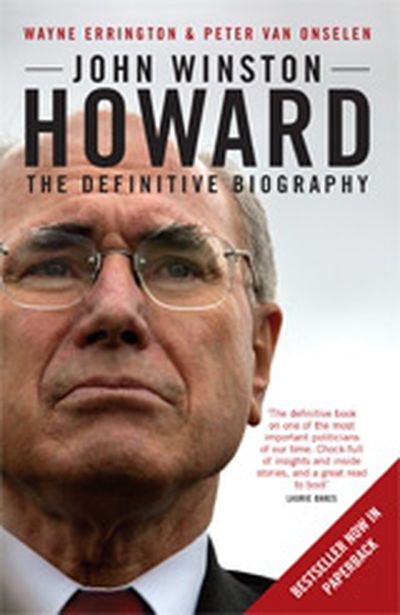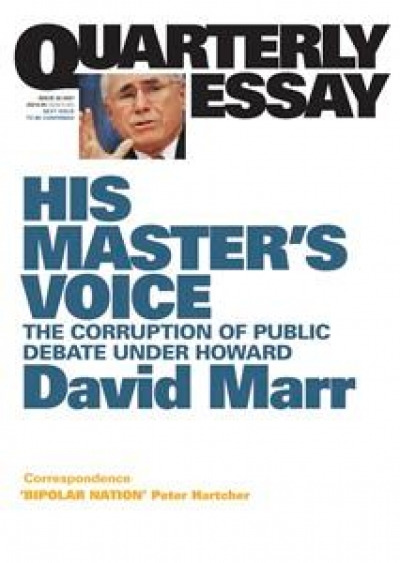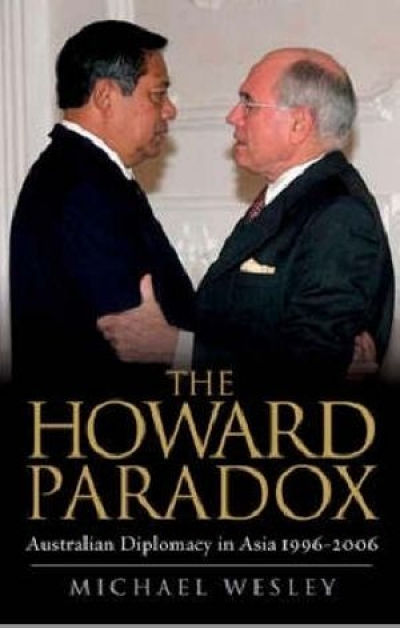Australian Politics
John Winston Howard: The biography by Wayne Errington and Peter van Onselen
Contemporary biography presents many challenges, even more so when the subject is a politician who is still in office. It is, at best, a progress report: necessarily provisional both in its analysis and its attempt to anticipate the weightier judgment of history. By its very nature, it inclines more towards journalism than towards scholarly assessment.
... (read more)Which School?: Beyond public vs private by Joana Mendelssohn
Joanna Mendelssohn is best known as an art critic and historian. After the publication of an essay in The Griffith review entitled ‘Going Private’, Pluto Press commissioned her to write a piece for its Now Australia series. Similar to Black Inc.’s Quarterly Essays, but even more determinedly non-academic, the Pluto Press format is part of a publishing phenomenon and covers a range of political, intellectual and cultural views on public issues and debates. The authors are not necessarily experts in the area they write about, nor are their views always based on systematic, in-depth research.
... (read more)Weighing up Australian Values: Balancing Transitions and Risks to Work and Family In Modern Australia by Brian Howe
One of the major cliches of recent years is the retiring politician’s parting statement, ‘I’m leaving politics to spend more time with my family’. Indeed, the tensions between work and family commitments have become a regular topic in the media. Newspaper articles sometimes cite the views of prominent social scientists, whose academic publications affirm the popular view that society as a whole benefits from fostering a working environment that acknowledges the importance of family and community. With Weighing up Australian Values, Brian Howe, a former deputy prime minister (1991–96), becomes the latest in a long line of Australian authors to promote public policies that encourage work-life balance.
... (read more)His Master’s Voice: The corruption of public debate under Howard (Quarterly Essay 26) by David Marr
The continued success and quality of the Quarterly Essay series has done much to promote the long essay as a legitimate forum for detailed, informed and accessible political discussion. That this has occurred during the Howard era suggests that all is not lost in the quest for genuine public debate. In the latest Quarterly Essay, David Marr acknowledges that, ‘[s]uppression is not systematic. There are no gulags for dissidents under Howard.’ Nevertheless, His Master’s Voice is born of, and fuelled by, exasperation. Marr makes little effort to mask his personal enmity towards John Howard. And his disgust at the manner in which the federal Coalition has governed for more than a decade is palpable: ‘Since 1996, Howard has cowed his critics, muffled the press, intimidated the ABC, gagged scientists, silenced non-government organisations, neutered Canberra’s mandarins, curtailed parliamentary scrutiny, censored the arts, banned books, criminalised protest and prosecuted whistleblowers.’
... (read more)Whoever wins the federal election later this year, it is likely that at some stage in 2008 we will be looking back and post-mortemising the Howard government. One strand in the reviews will surely be the Howard government’s impact on the quality of public debate in this country. Whether it has been a contributor to Howard’s long ascendancy (and I think it has), this government’s ability to goad large numbers of academics and commentators into unbalanced and increasingly hysterical denunciations of nearly all aspects of its operations is unprecedented in Australian political history.
... (read more)The Howard Paradox: Australian diplomacy in Asia 1996–2006 by Michael Wesley
Canberra’s week of the two presidents – October 2003 – brought the unprecedented spectacle of George W. Bush and China’s President Hu Jintau speaking just a day apart to joint sittings of the Australian parliament. The coincidence elegantly dramatised the central questions for Australian foreign policy: how we manage our relationships with our superpower ally, how we live with our neighbours in Asia, and how we get the balance right between them. This has been the essential challenge for every Australian government since World War II. In his important new book, The Howard Paradox, Michael Wesley focuses on one side of that balance – relations with Asia – and on the Howard government.
... (read more)Tom Uren was a prisoner of war on the Burma Railway during World War II, a professional boxer in his youth and one of the dominant voices of the Australian left for much of the second half of the twentieth century. Martin Flanagan offers a wide-ranging reflection on Uren’s life, drawing on his experience growing up in the working-class Sydney suburb of Balmain to his days as minister for urban and regional development in Gough Whitlam’s government. In doing so, The Fight conveys the resilient and visionary spirit that was central to Uren’s character. But Flanagan’s stated purpose is much more than biographical; his aim is to show the need in contemporary Australian society for the passion and vision Uren displayed throughout his life.
... (read more)Silencing Dissent: How the Australian government is controlling public opinion and stifling debate edited by Clive Hamilton and Sarah Maddison
It is little appreciated just how much power and influence are wielded by a successful Liberal prime minister, success being measured entirely by electoral victory. Whereas a Labor prime minister has a caucus, factions, the ACTU, a not always co-operative national executive and a sometimes fractious national conference to exert countervailing influence, a conservative leader is remarkably unfettered. The party, and indeed the government, becomes an extension of him, a mere appendage.
... (read more)Mortgage Nation: The 2004 Australian Election edited by Marian Simms and John Warhurst
Australian elections are not what they used to be. The policy debates have been reduced to ten-second audio grabs. The big public rallies have been replaced with pre-packaged and scripted set-piece television events. According to the majority of the contributors to this account of the 2004 election, the passions that Australian voters once carried to the polling booth have been swapped for something much more prosaic. At the last election, our vote was apparently determined largely by interest rates and by mortgage costs. It seems that voters are now less animated by ‘It’s Time’ and more by ‘It’s Mine’.
... (read more)An Australian Republic by Greg Barnes and Anna Krawec-Wheaton
An Australian Republic presents itself as the book to reopen the republic debate – a defibrillator for our body politic. It turns out, however, to be another example of the lazy argument that marks much of Australia’s progressive discourse. It answers to nothing but its own echo chamber. Meaningless sentences such as ‘Australia is a nation of multiple and changing identities; a moving kaleidoscope of diverse and colourful images’ abound; baseless statements – such as ‘for many of those immigrants … a constitutional system that identified both structurally and symbolically with Australia’s British origins was incompatible, unfamiliar, and indeed alien’ – are supported with the barest of evidence (the quote’s footnote refers readers to an article in Feminist Review entitled ‘The Republic is a Feminist Issue’). Inconsistencies stick out like bookmarks: John Howard’s narrowly economic definition of Australianness ‘promotes a distinctive and exclusively white, male-orientated, Brito-centric identity’. True, perhaps, but this could equally be said about other conceptions of Australian identity presented, without censure, on the preceding page.
... (read more)








